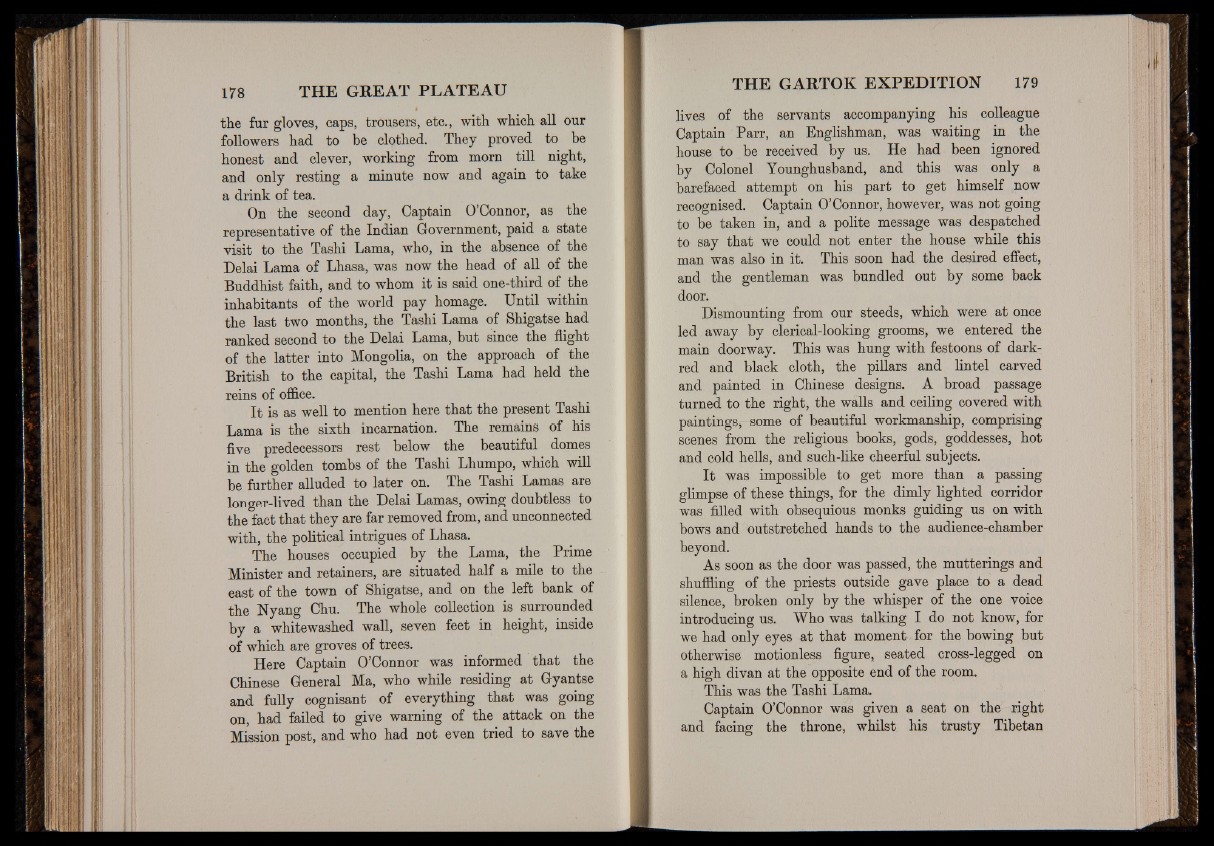
the fur gloves, caps, trousers, etc., with which all our
followers had to be clothed. They proved to be
honest and clever, working from morn till night,
and only resting a minute now and again to take
a drink of tea.
On the second day, Captain O’Connor, as the
representative of the Indian Government, paid a state
visit to the Tashi Lama, who, in the absence of the
Delai Lama of Lhasa, was now the head of all of the
Buddhist faith, and to whom it is said one-third of the
inhabitants of the world pay homage. Until within
the last two months, the Tashi Lama of Shigatse had
ranked second to the Delai Lama, but since the flight
of the latter into Mongolia, on the approach of the
British to the capital, the Tashi Lama had held the
reins of office.
It is as well to mention here that the present Tashi
Lama is the sixth incarnation. The remains of his
five predecessors rest below the beautiful domes
in the golden tombs of the Tashi Lhumpo, which will
be further alluded to later on. The Tashi Lamas are
longer-lived than the Delai Lamas, owing doubtless to
the fact that they are far removed from, and unconnected
with, the political intrigues of Lhasa.
The houses occupied by the Lama, the Prime
Minister and retainers, are situated half a mile to the
east of the town of Shigatse, and on the left bank of
the Nyang Chu. The whole collection is surrounded
by a whitewashed wall, seven feet in height, inside
of which are groves of trees.
Here Captain O’Connor was informed that the
Chinese General Ma, who while residing at Gyantse
and fully cognisant of everything that was going
on, had failed to give warning of the attack on the
Mission post, and who had not even tried to save the
lives of the servants accompanying his colleague
Captain Parr, an Englishman, was waiting in the
house to be received by us. He had been ignored
by Colonel Younghusband, and this was only a
barefaced attempt on his part to get himself now
recognised. Captain O’Connor, however, was not going
to be taken in, and a polite message was despatched
to say that we could not enter the house while this
rna.n was also in it. This soon had the desired effect,
and the gentleman was bundled out by some back
door.
Dismounting from our steeds, which were at once
led away by clerical-looking grooms, we entered the
main doorway. This was hung with festoons of dark-
red and black cloth, the pillars and lintel carved
and painted in Chinese designs. A broad passage
turned to the right, the walls and ceiling covered with
paintings, some of beautiful workmanship, comprising
scenes from the religious books, gods, goddesses, hot
and cold hells, and such-like cheerful subjects.
It was impossible to get more than a passing
glimpse of these things, for the dimly lighted corridor
was filled with obsequious monks guiding us on with
bows and outstretched hands to the audience-chamber
beyond.
As soon as the door was passed, the mutterings and
shuffling of the priests outside gave place to a dead
silence, broken only by the whisper of the one voice
introducing us. Who was talking I do not know, for
we had only eyes at that moment for the bowing but
otherwise motionless figure, seated cross-legged on
a high divan at the opposite end of the room.
This was the Tashi Lama.
Captain O’Connor was given a seat on the right
and facing the throne, whilst his trusty Tibetan